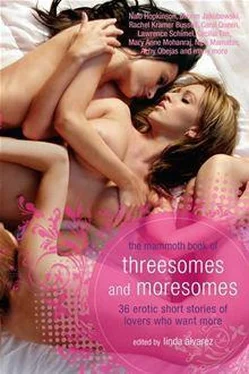I fought and contorted myself trying to keep David inside of me. Caught in between us, David was falling apart, on the verge of burst ing. He was snorting like Quixote’s Rocinante, shouting for God, sobbing quietly, for all of us. I joined in their guttural wails. It was the holiest and saddest of choruses. And then like a crescendoing car alarm screaming at the night, it was over.
Sergi pulled out and walked out. David fell into a ball of wasted flesh in coital position beside me. At that moment, I couldn’t imagine a greater pain than loving a weak man. He couldn’t look at me, at least not yet. Then I thought of my mother, thought of what she would think, if anything as terrible had ever happened to her in her life.
I craved solitude and began sliding my body off the edge of the bed. My knees cracked, my joints ached. I reached for my pants suit lying in two disjointed pieces on the floor. I grabbed my shoes, my bag, and walked barefoot out of the room, down the swirling corridor of mosaic tiles, past Sergi’s room with its door closed, and out the front door, leaving them alone in their stifling silence. My heart pounded loudly in my ears.
As I stepped out of the elevator and on to the shaded entrance of La India’s outer lobby, I remember thinking that I didn’t feel a single emotion. Neither happy nor sad. But I must have been wearing some kind of face, because a straight line of cheery tourists slowed down to look at me as they passed. I rummaged through my bag and found a last bent cigarette. I gave it one puff, looked right back at their innocent sun-blotched faces and had the urge to vomit.
Turning the corner off Carrer de Carme, I let it all out. The en tire night’s bile released on to the grey, rounded-stone streets of this Iberian port city that had witnessed so many centuries of misery.
I hung my head down for a while and watched the last string of saliva detach itself from my mouth. Holding myself up with one hand on the stone wall before me, I found its coldness provided a sobering effect. I wiped my chin with my sleeve and slicked my hair back from my face. As I straightened myself up, an old and squat Catalan couple walked by me, cautiously observing me with two sets of beady brown eyes. There was a rose in her hand and a book tucked safely under his left arm.
It was Diada de Sant Jordi. The sun felt strong. It’s nice to be warm when you’re feeling cold. I decided I would walk to las Ramblas and browse all those books I had yet to read. Buy a book, maybe two, maybe three. It was the new beginning I had wanted, though it was a beginning to an end. But I was good at endings.
Then a song popped into my head. It was a song that used to make my mother cry whenever she heard it in passing. “Perfidia”, Treachery, was its name. La perfidia de tu amor.
There was no turning back. Barcelona’s morning sky was the steeliest of blues.












